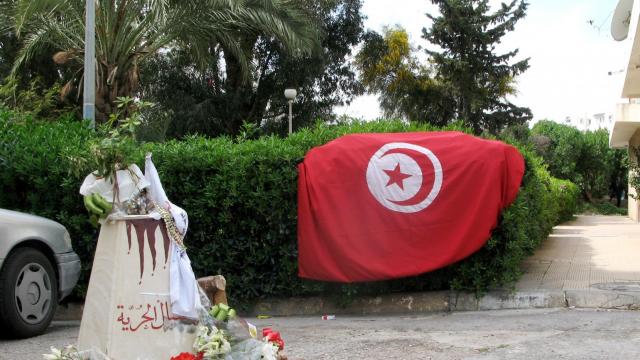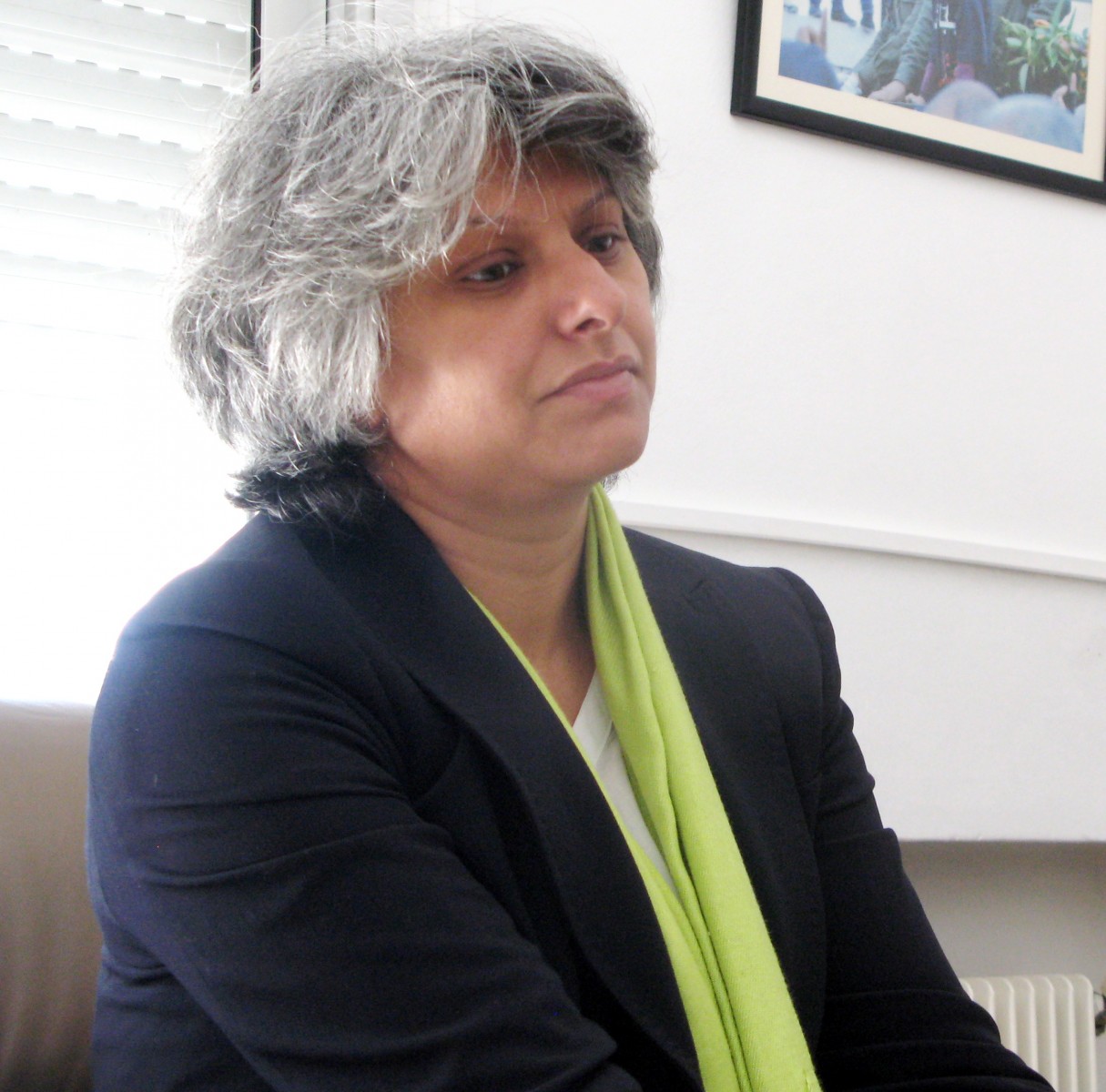
The memorial outside Chokri Belaid's apartment on the spot where he was slain in February.
Basma Khalfaoui, the widow of Tunisia’s recently assassinated political and social leader Chokri Belaid, was one hour late for our meeting at her home last Saturday.
She is often late these days, occupied with an unending stream of interviews and inaugurations of the Tunis streets and squares that are now being renamed for her husband—the lionized 47-year-old lawyer, political organizer and left coalition leader who was gunned down while leaving their apartment on the morning of February 6.
Chokri’s killing traumatized Tunisian society, throwing the country’s fractured political order into new disarray as hundreds of thousands filled the streets of the capital, day after day, in an outrage demanding justice. 1.5 million Tunisians came out on the day of his actual funeral, which is noteworthy in a country of just 10 million. The head of the Patriotic Democratic Unified Party, and leader of the fast-growing Popular Front made up of worker, progressive and left-leaning parties, Chokri was more than a rising political figure; to a growing number of Tunisians he embodied the moral and transformative values of the revolution that forced dictator Zine El Abidine Ben Ali from power in January of 2011 and ignited the Arab Spring.
Now, nearly two months after his assassination, most people here acknowledge that Tunisia will remain mired in conflict and uncertainty, unable to advance toward building a genuine democratic state until the political and economic actors responsible for his death become known.
While I waited for Basma to arrive for our talk, I had a look around the grounds. Chokri and Basma’s apartment is located in the quiet residential neighborhood of Menzah 6, near El Manar University in northern Tunis. The simple eight-story building is framed by a yard that contains pine, palm and eucalyptus trees. A few feet away, in the parking lot, a waist-high memorial topped with jasmine flowers, beads, candles—and the words written in red, “Assassination of Freedom, Hommage au Camarade Chokri Belaid”—marks the space where Chokri was shot dead, shortly after 8am, after getting into the backseat of his vehicle.
According to two young ambulance drivers I met, who said their colleagues were the first ones on the scene after the shooting, the assailant had fired four bullets: one broke the back window, another penetrated the car’s front seat, and the other two entered Chokri’s neck and chest. While his driver sat stunned but uninjured in the front seat, the ambulance men removed Chokri from the car and drove him immediately to the hospital, although he was already dead. Two Salafist men have since been arrested in connection with the killing, with suspected ties to the ruling religious Ennahda Party.
“Freedom is not enough”
Basma’s niece, Nisrin, invited me along with several colleagues into the apartment to wait for her. We sat on chocolate-colored sofas in the white-walled living room. The metal blinds were half drawn on the sliding door that led out to a balcony, and on a wall hung a framed photograph of Chokri and Basma’s 12-year-old daughter flashing a hurt, angered look during the military funeral that was held for her father. Nisrin told us that Basma was receiving more requests than she could handle in recent weeks; “sometimes she can’t find time to eat,” she said.
At 11 o’clock, Basma entered. Attractive, with a head of wavy gray hair, Basma was wearing jeans, black boots, a navy blazer and a lime green scarf around her neck, and gave off an instant air of sophistication. Her demeanor was serious, straightforward and at the same time welcoming. With limited time at her disposal she launched in.
“After the revolution, we can’t deny we got freedom,” she began, “freedom of expression, of press. But freedom is not enough. In terms of dignity and jobs, we did not advance at all. This government proclaimed it created 1,200 jobs. But look at them, they’re marginal jobs for gardeners, for small shopkeepers. They aren’t durable. Dignity means recreating yourself with work, with income, and for this the government has no strategy.”
Basma is an attorney and long-time advocate in the women’s movement, which gained new momentum following the Arab Spring. As a member of the Tunisian Association of Democratic Women, she has helped women achieve greater health, income and improved conditions in the home and society. “I see no contradiction in defending women’s issues and class issues. Women continue to fight for their rights,” Basma said.
“The difference now is that they must move to a leading position, not only in government but in other movements. Women now are capable of really taking that lead.”
In 1999 Basma met Chokri, a man who had grown up in a poor, working class suburb of Tunis and experienced politics early—and also its consequences, under a regime that did not tolerate dissent. While a student at university, Chokri had organized and led protests demanding better rights to education. He was sent as punishment to Rejim Maatouj, a Sahara military base in the south of the country, where he lived one year.
Barred afterwards from re-entering Tunisian university, Chokri moved to Iraq where he studied law for four years. He then returned to Tunisia, said Basma, where he “became known for great efficiency and competency in his profession. His experience in Iraq deepened his faith in democracy.” He later stated his clear opposition to the U.S. invasion of Iraq, and participated on the international Arab defense team that defended Saddam Hussein prior to his execution.
But it wasn’t until 2008, when Chokri began pro bono work defending young miners and their families in the phosphate mining region of southwestern Tunisia, that he became a nationally recognized figure.
Chokri “sensed the spark of revolution in the miners movement,” said Basma, and he became the leading advocate of workers who were seeking better wages, health and safety conditions from the national mining company, and who were imprisoned for their rebellion.
“He spent 12- and 14-hour days traveling, visiting families, defending prisoners,” she said, and it was at that point he “really turned his revolutionary theories about workers and the poor into practice, as he came into wide contact with the people” he was helping.
Building “a great party of the left”
That movement exposed one of the first cracks in the authoritarian rule of Ben Ali, and Chokri’s leadership became a new response to the fear and obedience that Tunisians had been living under—and was a precursor to the uprising in December of 2010, following the self-immolation of the street vendor Mohamed Bouazizi, which weeks later toppled the regime.
After the Tunisian revolution, as Islamists and Western-facing technocrats vied for control, Chokri quickly challenged the new establishment as an activist-politician modeled on the people’s aspirations. “The politicians didn’t allow access to the media, they were removed from the public,” said Basma, but “his milieu was among leftists: truthful, creative, and very good at relating theories to practical actions.”
Chokri hurriedly went to work building alliances for “a great party of the left.” As general secretary of the Patriotic Democratic Unified Party, Basma said, he began “inviting and gathering other activists with a shared, unified democratic vision, quickly unifying all leftwing people in a big party [known as] as the Popular Front.”
The coalition was gaining powerful support this winter, attracting workers, women’s groups and everyday Tunisians who saw their interests—and the revolution they fought to carry out two years before—being swallowed by a new political class of power holders, both religious and secular, who fomented conflict over Islam yet failed to address people’s stated needs for jobs, income, a just Constitution, a genuine democracy.
With this October’s elections looming and no Constitution in sight, Tunisia’s new establishment—which risks an all-out hijacking by the Salaffists who want to institute an Islamic state—was flailing. Chokri Belaid’s call for leftist democratic unity was threatening, possibly, to turn the tide.
And then, on the morning of February 6, he was killed.
“My message to the U.S. government,” said Basma, “is that they give us information about who killed Chokri. I want the American people to support the Tunisian people in deciding [our] future and destiny, to know that we don’t have a problem with religions, that Tunisia is an open country, we’re forgiving, we respect personal freedom.
“Chokri was, bit by bit, founding and building a democracy—a project for a better society,” she continued. “He was uniting people behind a cause that was open to differences, and he revealed the dirty use of religion for political purposes. As a voice who criticized his enemies directly, Chokri created an atmosphere of breaking fear, of confronting these people [in power] who have no economic, political or cultural projects.”
Assassinations do, as we have seen on many continents in many eras, change history. For those left behind the slain, some have responded by trying to carry out the vision their loved ones started. In Basma’s case, the next step—and how that step could impact Tunisia’s nascent democracy—is only beginning to take shape.
“I see myself as playing as much a role as I can unifying people in a progressive democratic project for this society. It’s not easy,” she said.
“I’m very angry and optimistic at the same time. I have all the will and energy to continue.”
3 WAYS TO SHOW YOUR SUPPORT
- Log in to post comments















